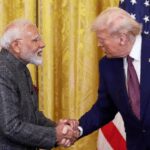This is an audio transcript of the FT News Briefing podcast episode: ‘Swamp Notes: How protectionism got trendy’
Sonja Hutson
Do you have questions about the 2024 election for our Swamp Notes panellists? Well, here is your chance to ask them. On September 12th, join Swamp Notes regulars like Peter Spiegel, Lauren Fedor and Rana Foroohar for a live webinar. Register now and you can submit questions ahead of time. This event is for FT subscribers. You can find more information in our Show Notes.
[MUSIC PLAYING]
US Steel was once the world’s largest company. It produced two-thirds of all American steel. Today, that number is under 10%. But when the Japanese steelmaker Nippon tried to purchase and revive US Steel to its former glory, lawmakers on both sides of the aisle were like, “I don’t know about that”.
[MUSIC PLAYING]
This is Swamp Notes, the weekly podcast from the FT News Briefing, where we talk about all of the things happening in the 2024 US presidential election. I’m Sonja Hutson, and this week we’re asking, how did protectionism get so trendy? Here with me to discuss is Sam Fleming. He’s the FT’s economics editor. Hi, Sam.
Sam Fleming
Hi.
Sonja Hutson
And I’ve also got James Politi, the FT’s Washington bureau chief. Hi, James.
James Politi
Thanks, Sonja.
Sonja Hutson
So, Sam, I want to start with you because you wrote a Big Read this week and it highlighted how national security concerns are being used as a justification for a more protectionist economic policy. When did this trend start?
Sam Fleming
I mean, there are long routes, to the primacy and importance of national security in US policymaking in general. But where you really start to see it accelerate is, first of all, under, under Donald Trump’s presidency and the, and the trade wars there. But then increasingly, after the Covid pandemic, where you saw these global supply chain disruptions, the sense of how important supplies of basic medical materials and ingredients for medicines were, and also concern about the reliance on, on Chinese-made supplies in the US, which helped to really turbocharge this idea that, there needs to be greater self-reliance in the US. So, I think it’s fair to say in Europe, after the end of the Trump administration thought there would be a, a big shift in direction, I think that proved to be incorrect. And certainly the, the hawkish approach to US-China relations was very much, embraced and continued under the Biden administration. And really, it’s become, you know, more and more systematic and systemic.
Sonja Hutson
The Democrats decided they wanted to, to hop on the trend. James, can you lay out for us what the positions on both sides of the aisle here are? I mean, are Democrats and Republicans basically pitching the same trade policies, just dressed up a little differently?
James Politi
Well, I mean, I think there’s a difference between what we’re seeing from, say, the Trump campaign at the moment and the Harris campaign on the other side. Trump’s plans for a second term are in a way much more radical. So he’s vowed to impose a 60% across-the-board tariff on imports from China. And he suggested that he would also impose a 10 to 20% tariff on all imports from everywhere, including US allies. It’s true that, I think, we’re seeing a bipartisan consensus in favour of more protectionist policies than we’ve seen from any previous administrations. But there is a difference in, in degree and emphasis from Harris and Trump.
Sonja Hutson
James, on the election. You know, you were talking a little bit about what the Harris and Trump campaigns have been saying about trade policy. But what are the politics behind these protectionist policies, this trade strategy? I mean, which voters are Trump and Harris trying to reach with this?
James Politi
I mean, I think that there’s been a pretty strong shift in American politics and in voter sentiment, away from, kind of just, you know, an embrace of globalisation and, and, you know, the assumption that free market economics is going to work and is the ideal policy, but having a tougher stance on trade is more helpful. It shows concern with domestic jobs, with, patriotism, to a certain extent. It’s something that even before Trump, you know, you’d see occasionally George W Bush instituted, you know, safeguards for the steel industry during his first term. Barack Obama took a tougher stance on trade himself during his administration. But it wasn’t until, really Trump’s election in 2016 that there was a sense that you could run a campaign on an anti-trade and a very staunchly anti-trade message, and you could win.
Sam Fleming
I mean, given the trend that James is highlighting and the, the political resonance of this, this kind of protectionism, part of the criticism of the national security angle, or at least the question surrounding it, is to what extent national security concerns often being used as a pretext, for thinly disguised protectionism. And what is the goal? And the goals can overlap quite a lot. Is the idea to protect manufacturing jobs in the US? Is the idea to protect national security? Is the goal to boost the clean energy transition? Is it all three? What takes primacy that there aren’t really very many guardrails, especially around national security as a justification. And so there is going to be, you know, increasing scrutiny, I think, of the, of the, of the bases on which this ever expanding, perimeter of national security concern is justified.
[MUSIC PLAYING]
[WIRED POLITICS LAB AD PLAYING]
Sonja Hutson
It seems like from what you’re saying, that there’s not a super clear definition about what national security is in this context. And the Nippon Steel case that I raised at the beginning of the show is a really good example of that.
James Politi
Yeah. So I think on the Nippon Steel case, it’s a pretty glaring, you know, contradiction there, because what you’re looking at is an international transaction between two big steel companies, one based in the US, one based in Japan, which is an ally of the US, and the opposition coming from the Biden administration, which has then been reiterated by Harris, is based on the belief that, you need to protect American jobs. You need to protect Pittsburgh. The steel industry is vital to US national security. But then you hear what the, the companies are saying and what US Steel is saying, and they’re saying, well, actually, if we don’t do the steel, there are going to be jobs that are at risk. You know, we might have to move our headquarters away from Pittsburgh. And, is blocking this transaction truly in the interests of American consumers and the long-term viability of the industry? And I think that’s the question that sort of everyone’s grappling with, and that is, is perhaps a bit baffling about the whole discussion around this transaction.
Sam Fleming
I think it is a really interesting case study, as James has been outlying on this question of how do you define national security? Because if this deal is to be blocked on national security grounds by a Japanese purchaser at the same time wen we reported this week about an issue with Chinese-made cranes, where, again, there’s a national security concern in the Biden administration that cranes are made in China could contain equipment which allows snooping on, on port shipments and movements in US ports, which is one of the reasons why they’re looking at imposing tariffs on them. The same time the plan that the Biden administration has been working on has involved getting Japanese and Finnish crane producers to invest in the US. So how do you reconcile that particular approach to national security with two allies, with the approach to the steel transaction? It’s just, it’s difficult sometimes to, to detect a consistent philosophical, strategic approach to this topic.
Sonja Hutson
Well, okay, so it sounds like this Nippon Steel case has a pretty limited basis in national security. And also that blocking the deal is probably not going to save a bunch of jobs in Pennsylvania. So what are Biden and Harris thinking here? I mean, is it pressure from unions? Is it pressure from voters on the ground?
James Politi
Well, first of all, the steel workers, oppose the deal. And the steel workers are very and a very important constituency for the Democrats. And they, they have supported Biden. They’re supporting Harris, in this election. So it’s a pretty important constituency. The other thing that I sometimes wonder and that, I think, people are grappling with is that is it really necessary to focus so much attention on domestic manufacturing and the steel workers and the auto workers and the unions in electoral campaigns? Pennsylvania is a very economically diverse state. It’s not necessarily as dependent on manufacturing as it used to be. It doesn’t all hinge on the sort of steel towns of western Pennsylvania that don’t really exist in the same form as they did 30, 40 years ago. The elections in Pennsylvania are mostly won and lost in the, in the swing suburban, affluent and middle-class counties around Philadelphia and in battleground areas of the Lehigh Valley. And it’s just kind of fascinating that the focus continues to be on, sort of an industrial America that doesn’t necessarily exist anymore.
Sonja Hutson
So zooming way out from Philadelphia, from the Lehigh Valley. Sam, I want to ask you about how American allies in Europe are feeling about this trend, especially ahead of the election.
Sam Fleming
So, as I said earlier, the European Union and European allies of the US, after the Trump administration, when Biden was preparing to come in, were hoping that trade would be a far less contentious area of policy. And certainly initially there were some deals between the EU and US which suggested things were, were going to be a little bit more consensual. However, first of all, there was the continued hawkish trend towards China, which puts countries, especially Germany, but also France and others in a difficult position given their deep trade links with China. But then on top of that, the implementation of the CHIPS Act from semiconductors, but also the Inflation Reduction Act on green technologies contained mechanisms which certainly favoured investment in the US at the expense of European producers. In a sense, I don’t think, from speaking to officials in this area, they’re expecting some sort of radical change after the election, depending if it’s Kamala Harris instead of Donald Trump. I think they expect it to be fairly difficult, no matter which of the two candidates wins. I think the, the big difference is going to be they would expect a less direct, adversarial relationship with Harris than there would be with Trump because of the tariff measures that we spoke about earlier that Trump is considering.
Sonja Hutson
All right. I want to thank our guests. Sam Fleming, the FT’s economics editor. Thanks, Sam.
Sam Fleming
Thank you.
Sonja Hutson
And James Politi. He’s our Washington bureau chief. Thanks, James.
James Politi
Thanks, Sonja.
[MUSIC PLAYING]
Sonja Hutson
This was Swamp Notes, the US politics show from the FT News Briefing. If you want to sign up for the Swamp Notes newsletter, we’ve got a link to that in the show notes. Our show is mixed and produced by Ethan Plotkin. It’s also produced by Lauren Fedor. Special thanks to Pierre Nicholson. I’m your host, Sonja Hutson. Our executive producer is Topher Forhecz, and Cheryl Brumley is the FT’s global head of audio. Original music by Hannis Brown. Check back next week for more US political analysis from the Financial Times.





